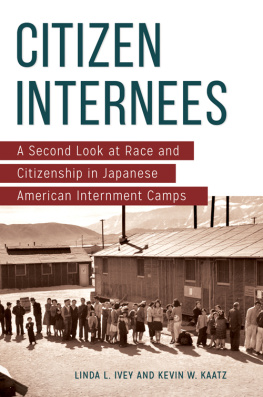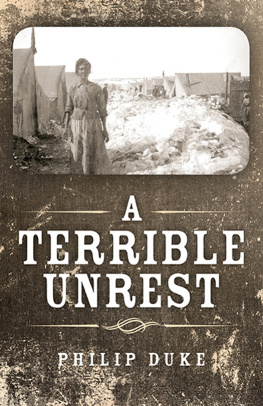Citizen Internees
Citizen Internees
A Second Look at Race and Citizenship in
Japanese American Internment Camps
Linda L. Ivey and Kevin W. Kaatz

Copyright 2017 by Linda L. Ivey and Kevin W. Kaatz
All rights reserved. No part of this publication may be reproduced, stored in a retrieval system, or transmitted, in any form or by any means, electronic, mechanical, photocopying, recording, or otherwise, except for the inclusion of brief quotations in a review, without prior permission in writing from the publisher.
Library of Congress Cataloging-in-Publication Data
Names: Ivey, Linda L., author. | Kaatz, Kevin W., author.
Title: Citizen internees : a second look at race and citizenship in Japanese
American internment camps / Linda L. Ivey and Kevin W. Kaatz.
Description: Santa Barbara, California : Praeger, an Imprint of ABC-CLIO, 2017. |
Includes bibliographical references and index.
Identifiers: LCCN 2016052235 (print) | LCCN 2017000568 (ebook) |
ISBN 9781440837005 (alk. paper) | ISBN 9781440837012 (ebook)
Subjects: LCSH: Japanese AmericansEvacuation and relocation, 19421945. |
World War, 19391945Japanese Americans. | United States. War Relocation
Authority.
Classification: LCC D769.8.A6 I89 2017 (print) | LCC D769.8.A6 (ebook) |
DDC 940.53/1708956073dc23
LC record available at https://lccn.loc.gov/2016052235
ISBN: 978-1-4408-3700-5
EISBN: 978-1-4408-3701-2
21 20 19 18 17 1 2 3 4 5
This book is also available as an eBook.
Praeger
An Imprint of ABC-CLIO, LLC
ABC-CLIO, LLC
130 Cremona Drive, P.O. Box 1911
Santa Barbara, California 93116-1911
www.abc-clio.com
This book is printed on acid-free paper 
Manufactured in the United States of America
To Doug and Elizabeth, as always.
To Jim for his support, Liv for the smiles, and Marcella for always being there
during times of writing.
Contents
Chapter 2 History of the Japanese and Anti-Japanese
Sentiment in California
Preface
In the summer of 1990, an unidentified man entered the Redwood City Public Library in California. He explained to the librarian at the front desk, Jeanne Thivierge, that he had in his possession some documents from the local branch of the bank that at one point he was asked to destroy after the war. He had thought better of it and had confiscated the papers in question. Today he was there in the library to turn those documents over to the public.
It sounds a bit like the beginning of a spy novel, and to be truthful, it is difficult to know how risky his actions were, if daring at all. But despite the likely romanticization of this actour heros secretly absconding with highly classified documentswhat he delivered was enough to hook the interest of a group of historians working in the San Francisco Bay area. The man had delivered more than two thousand previously unread World War IIera documents, primarily correspondence between the vice president of the First National Bank, J. E. Morrish, and the interned citizens of Japanese descent from Redwood City. The act of saving these documents from the dustbins of history was heroicwith so many oppressed voices of our past silenced or missing, this was an act worth dramatizing. Plus, its a heck of story with which to start a book of historical documents.
The following pages serve as an introduction to this collection of documentsfrom this point forward referred to as the Morrish Collection. We werent sure what we would find in this collection, and some preliminary skimming of the documents seemed less than promising. Mr. Morrish wrote to someone to inform them that he had paid their taxes. That person wrote back to say thank you. Maybe this is why our unnamed man was asked to destroy them.
But as we immersed ourselves deeper into the collection, the narratives of families and experiences began to emerge. More than that, through the correspondence with their banker, we witnessed these families adapt to their circumstances in an effort to go about their business as usual. In one sense, the very mundane act of paying taxes takes on a different meaning when the taxpayer is being detained without due process. There were properties to be managed, rents to collect, business associations to attend to. They had to plan for their future, despite its uncertainty. The internees were not prisoners in the legal-status sense of the word. So what was their legal status? They could vote. They could collect social security. They could serve in the military, and they could collect survivors benefits. In some cases, they could accept work outside of the camps but had to go through a lengthy petition process to leave. But they could not live in their homes. They lived behind barbed wire. How does one continue the business of being a resident of the United States while being forcibly removed not only from your home, but from your properties, your businesses, your bank accounts, your entire manner of living, playing, engaging, and existing as a contributing member of American society? How does one function as a citizen internee?
The legal status was never clearly defined; there was never a recognizable process of law. Nonetheless, the decision to intern was given a collective pass by the public and the government. A structure began to develop around the act of removal, operating via the War Relocation Authority (WRA), a civilian organization at once supporting the internees and supporting the internment. The WRA, along with white liberal supporters of the Japanese and Japanese Americans (like Morrish), facilitated as best they could an open flow of communication and money. Morrish, for one, became a caretaker of people and their places. The WRA was determined to make the internment work smoothly by doing the job as a democracy should. But the WRA, while guided by a pledge to operate humanely, in fact, succeeded in creating a structure and a language to legitimize, on a federal level, an elastic definition of citizenship in which ethnic and racial minorities in the United States continue to operate. It was a normalizing, legitimizing process of a very un-normal act.
Within these pages lie testaments to the life goes on experience of internment. Logically, students of the internment should know that those interned did not simply wallow as victims, voiceless and without thought for over four years. They also may intuitively sense that there was more to their lives than baseball games and camp newspapers and makeshift kindergartens. The documents herein expose details of financial, political, personal, and civic reality. Moreover, they begin to unwrap how Japanese and Japanese Americans operated within the structure of the internment as landowners, property owners, and, in a majority of the cases, as U.S. citizens. They prompt us to pose questions about how such a structure to allow and support the stripping of constitutional rights and human dignity in a modern, stable, and oft-claimed exemplary democracy could develop. Ultimately, they remind us that the possibility of abrogating the rights of citizenship remains perhaps dormant but needs vigilant watch.
Citizen Internees was really an organic process of thinking and writing, as we paced ourselves in figuring out what this collection could offer in terms of adding complexity to the narrative of the internment during World War II. We had many more documents to choose from than could make it into the book, so we found ourselves cherry-picking the meatiestor at least most meaningful, as we saw themfor inclusion. The book provides a familiar chronological narrative of internment but aims to focus specifically on these documents and these people, and to write about this with attention to the collaborative construction of the role of citizen internee.
Next page












